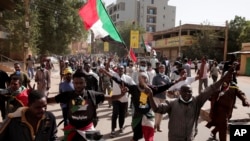The U.N. human rights office has condemned what it says is the brutal, disproportionate use of force by Sudan’s security forces against peaceful protesters, many of whom reportedly are being killed and injured every day.
The military mounted a coup d'état against Sudan’s civilian government on October 25. Since then, credible statistics from the Central Committee of Sudan Doctors show state security forces have killed 71 people and injured more than 2,200. Of these, 17 have been killed this year.
U.N. monitors report such atrocities occur on an almost daily basis. On Monday, they noted security forces used live ammunition to break up a demonstration in the capital Khartoum, killing seven protesters and injuring dozens.
The use of live ammunition is only permissible as a measure of last resort under international law. U.N. human rights spokeswoman, Ravina Shamdasani, said a thorough, independent investigation into these violations must take place promptly. She added the authorities must bring the perpetrators of human rights violations to justice.
"It is crucial that these investigations take place. In fact, this is one of the calls of the protestors as well. They are calling for an investigation of civilian rule and they are calling for accountability. And every time there are additional killings, additional violence against peaceful protesters, it emboldens the protest movement and there are further protests, further violence," said Shamdasani.
She said this is clearly not the path to the restoration of sustainable, peaceful civilian rule in Sudan.
Shamdasani told VOA military authorities justify their actions by claiming they are trying to maintain public order. She said they claim protesters have used violence and that some of those who have been arrested are responsible for the killing of an army official as well.
“But our monitoring of the protests has shown that they are by in large very peaceful. The most force that we have seen used is protesters throwing stones. Nothing at the level of the live ammunition that is being used by the military in responding to the protesters,” she said.
Shamdasani notes the United Nations does not recognize the military leaders as the legitimate government of the country. However, as the de facto authorities in Sudan, they currently are in charge.
She said this means they have human rights obligations toward the people of Sudan. She says they are responsible for investigating allegations of human rights violations, including killings and gender-based sexual violence. And, she adds, the military leaders must hold the perpetrators of these crimes accountable.




